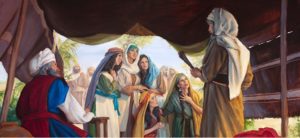Today we begin Numbers Chapter 27.
For the Complete Jewish Bible, click here.
For the King James version, click here.
What do you do when you encounter a challenging life situation for which there doesn’t seem to be any clearcut answer in the Scriptures?
I’m sure we’ve all faced this challenge at one time or another.
Life with all of its ups and downs is anything but black-and-white and predictable.
Heck no.
Life is more like a roller coaster traveling at high speeds through a multitude of unseen twists and turns that in a nightmare case scenario can veer right off the track.
Well, we encounter something like this here in Numbers 27, not anything incredibly serious or life-threatening like a roller coaster veering off its tracks, but a situation that did call for a re-application of God’s Law.
Understand however that God’s Law was NOT being changed here.
It was being more specifically defined and flexibility was being exercised in how the Law was carried out.
The scenario we encounter is about a man named Zelophehad who had passed away but left no sons to inherit his property and wealth.
However, he did have five daughters.
Well, these daughters, who seem to be well aware what the Torah says on the subject, approach Moses and ask him what’s so wrong with them inheriting their father’s wealth just because they’re not males?
Let’s take a look at what they say in verses 3 and 4.
“Our father died in the desert. He wasn’t part of the group who assembled themselves to rebel against Adonai in Korach’s group, but he died in his own sin, and he had no sons. Why should the name of our father be eliminated from his family just because he didn’t have a son? Give us property to possess along with the brothers of our father.”
Their reasoning is actually quite sound.
They make the point that their father did NOT participate in the rebellion of Korah when fire burst forth from the Tabernacle incinerating the rebels to death and then soon afterwards an earthquake split the ground in two which swallowed up thousands of men AND their families before closing up again.
Rather, they go on to say, our father “died in his own sin“.
That’s an interesting statement.
What exactly is this referring to?
It’s referring to the same curse that all the generation of those who had left Egypt but failed to trust the Lord and take the Promised Land were under.
Zelophehad’s daughters make the case that since all the other families whose fathers had committed the same sin were being given land in Canaan, why should their father’s family be denied just because he had no sons to inherit his portion?
Moses hears them out and tells them he will bring their case before the Lord.
Okay, what we’ve just encountered here is what we would call in our judicial system (in the USA) a PRECEDENT.
A “precedent” is simply a situation that arises for the first time, (in other words, there is no prior or former precedent).
Actually, when we examine the post-Sinai Scriptures carefully, we find that the adding of laws to deal with precedents occurred quite frequently.
How it worked was when a unique situation arose, the case was brought to Moses (the judge at the time) who would then take it to the Lord for a final decision and judgement.
Afterwards, Moses would inform the parties concerned of HASHEM’s decision and then what was up until that time a precedent became a LAW.
This is pretty much how the body of Oral Law was developed.
It was developed in order to deal with all of the myriad of sticky situations that life will throw at us.
Therefore, we see that there are basically ONLY TWO WAYS we receive laws from God.
One is by direct oracle as was given to Moses on Mount Sinai.
The second way is BY PRECEDENT whereby a unique situation arises demanding a re-application of what has already been established.
So how did HASHEM respond to the case of Zelophehad and his daughters?
In this case, this is what the Lord decided.
-If a family leader dies and leaves behind only daughters, his daughters may inherit what the sons would normally have inherited.
The Lord then expanded on His first ruling to establish these other laws:
-If a man has no children, his inheritance will go to his brothers.
-If he has no brothers at all, his wealth will go to his uncles on his father’s side.
-If the man doesn’t even have any uncles on his father’s side, then the nearest family relative (whether on the mother’s or father’s side) will inherit the family wealth and/or property.
I’m done.




Leave a Reply